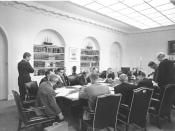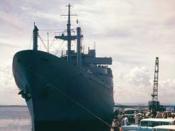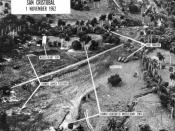For centuries, Unites States involvement in foreign affairs was virtually nonexistent.
Yet, with time, our nation evolved from a diplomatic island to a central continent of diplomacy.
The trend started with the growth of industrialism and flourished under the guiding hand of President Theodore Roosevelt. The importance of foreign affairs steadily escalated with both world wars and peaked with the rise of Soviet power and the onset of the Cold War. Thus, with the United States quickly becoming a major power in world diplomacy, the role of presidency expanded as well. With the discovery of Russian missiles in Cuba, Kennedy faced not only a diplomatic crisis, but a potentially deadly threat to nation security. Thus, using his Constitutional power as commander-in-chief and his ever evolving political power as chief diplomat, Kennedy successfully and justifiably attempted to remove the Russian missiles. Given these powers, Kennedy's reaction to the Cuban Missile Crisis followed both political and constitutional constraints.
President George Washington set the early tone for United States foreign relations with his farewell address to congress. In this famous farewell address, Washington called foreign diplomacy "one of the most baneful foes of republican government."ÃÂ Consequently, this view became the dominant mentality of the newly formed government. To the young nation, isolationism seemed attractive because it prevented serious entanglements with foreign powers and thus protected nation security. Because isolationism protected the United States from other nations, it could grow and flourish. Fortunately, this policy proved to be relatively easy to implement. Entire oceans separated the United States from both Europe and Asia, limiting interaction and conflict. Thus, our nation remained a largely isolated nation for centuries. With the exception of a few minor scuffles, United States foreign policy was practically nonexistent in Europe in Asia for centuries.
At the dawn of the twentieth...


